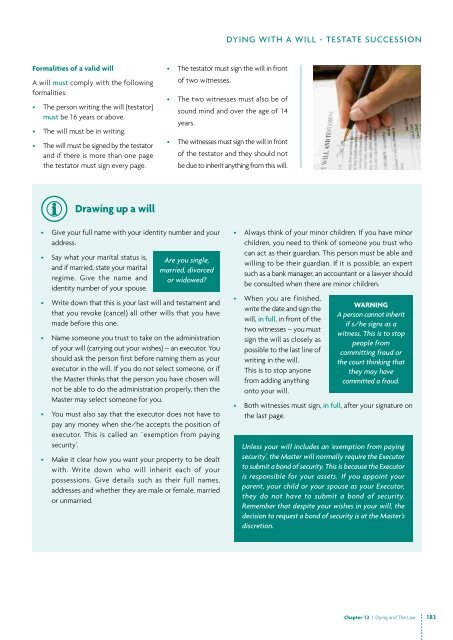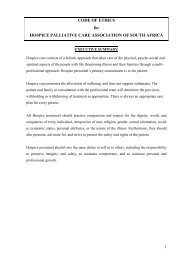Dying and The Law - Hospice Palliative Care Association of South ...
Dying and The Law - Hospice Palliative Care Association of South ...
Dying and The Law - Hospice Palliative Care Association of South ...
You also want an ePaper? Increase the reach of your titles
YUMPU automatically turns print PDFs into web optimized ePapers that Google loves.
DYING WITH A WILL - TESTATE SUCCESSIONFormalities <strong>of</strong> a valid willA will must comply with the followingformalities:• <strong>The</strong> person writing the will (testator)must be 16 years or above.• <strong>The</strong> will must be in writing.• <strong>The</strong> will must be signed by the testator<strong>and</strong> if there is more than one pagethe testator must sign every page.• <strong>The</strong> testator must sign the will in front<strong>of</strong> two witnesses.• <strong>The</strong> two witnesses must also be <strong>of</strong>sound mind <strong>and</strong> over the age <strong>of</strong> 14years.• <strong>The</strong> witnesses must sign the will in front<strong>of</strong> the testator <strong>and</strong> they should notbe due to inherit anything from this will.Drawing up a will• Give your full name with your identity number <strong>and</strong> youraddress.• Say what your marital status is,<strong>and</strong> if married, state your maritalregime. Give the name <strong>and</strong>identity number <strong>of</strong> your spouse.Are you single,married, divorcedor widowed?• Write down that this is your last will <strong>and</strong> testament <strong>and</strong>that you revoke (cancel) all other wills that you havemade before this one.• Name someone you trust to take on the administration<strong>of</strong> your will (carrying out your wishes) – an executor. Youshould ask the person first before naming them as yourexecutor in the will. If you do not select someone, or ifthe Master thinks that the person you have chosen willnot be able to do the administration properly, then theMaster may select someone for you.• You must also say that the executor does not have topay any money when she/he accepts the position <strong>of</strong>executor. This is called an `exemption from payingsecurity’.• Make it clear how you want your property to be dealtwith. Write down who will inherit each <strong>of</strong> yourpossessions. Give details such as their full names,addresses <strong>and</strong> whether they are male or female, marriedor unmarried.• Always think <strong>of</strong> your minor children. If you have minorchildren, you need to think <strong>of</strong> someone you trust whocan act as their guardian. This person must be able <strong>and</strong>willing to be their guardian. If it is possible, an expertsuch as a bank manager, an accountant or a lawyer shouldbe consulted when there are minor children.• When you are finished,write the date <strong>and</strong> sign thewill, in full, in front <strong>of</strong> thetwo witnesses – you mustsign the will as closely aspossible to the last line <strong>of</strong>writing in the will.This is to stop anyonefrom adding anythingonto your will.WARNINGA person cannot inheritif s/he signs as awitness. This is to stoppeople fromcommitting fraud orthe court thinking thatthey may havecommitted a fraud.• Both witnesses must sign, in full, after your signature onthe last page.Unless your will includes an ‘exemption from payingsecurity’, the Master will normally require the Executorto submit a bond <strong>of</strong> security. This is because the Executoris responsible for your assets. If you appoint yourparent, your child or your spouse as your Executor,they do not have to submit a bond <strong>of</strong> security.Remember that despite your wishes in your will, thedecision to request a bond <strong>of</strong> security is at the Master’sdiscretion.Chapter 12 | <strong>Dying</strong> <strong>and</strong> <strong>The</strong> <strong>Law</strong>183










